|
|
|
Sort Order |
|
|
|
Items / Page
|
|
|
|
|
|
|
| Srl | Item |
| 1 |
ID:
113357
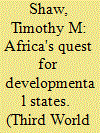

|
|
|
|
|
| Publication |
2012.
|
| Summary/Abstract |
After a generally disappointing half-century since recapturing formal independence, at the turn of the second decade of the 21st century, Africa(s) may now be able to seize unanticipated emerging opportunities to move from `fragile' or `failed' towards `developmental' political economies. The continent displays innovations in terms of sources of finance, new regionalisms & transnational governance leading to distinctive insights for analysis & policy, both state & non-state. Its potential for renaissance is reinforced by South Africa's accession as the fifth of the BRICS at the dawn of the decade.
|
|
|
|
|
|
|
|
|
|
|
|
|
|
|
|
| 2 |
ID:
154648
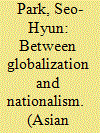

|
|
|
|
|
| Summary/Abstract |
Why, in recent years, has the South Korean government introduced various changes in its immigration policy, diverging from a long history of relative closure toward foreign workers in the East Asian region? While existing studies on labor migration utilize pluralistic models of interest aggregation and competition, examining the preferences of different domestic groups such as firms, native labor, and foreign-born immigrants, immigration has long remained underpoliticized in South Korea. Indeed, until the 2000s, the central government maintained strict policies banning the import of foreign labor, overruling other important economic or environmental factors such as sector-specific needs or a shrinking domestic workforce due to an aging population. In this article, I argue that a new political framing of immigration, made possible through a shifting domestic political context in which global human rights norms became more salient, led to important policy changes in the past decade. The South Korean case suggests that globalization has led to greater acceptance of foreign workers, less as a result of economic pressures but rather the pull of global standards, based on the Korean yearning for segyehwa (to become global) and becoming an “advanced” nation.
|
|
|
|
|
|
|
|
|
|
|
|
|
|
|
|
| 3 |
ID:
119484
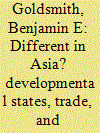

|
|
|
|
|
| Publication |
2013.
|
| Summary/Abstract |
In this article, I ask what might be the effect of international trade on interstate conflict in Asia and the Pacific. Overall, the associations of trade interdependence and trade volume in the region appear similar to those globally: interdependence is accompanied by a reduction in the chance of militarized conflict onset, whereas the volume of trade appears to reduce the chance of conflict escalation to deadly international violence. I suggest a partial exception for East Asia, implying weaker associations between trade and pacific outcomes. I argue that the regionally common 'developmental state' model allows such states to more freely, but less credibly, use trade as a foreign policy tool, reducing trade's constraint upon East Asian states in security affairs. Analyses of East Asian dyads and of developmental states in data from all regions of the globe support my contention that trade interdependence has weaker pacific effects in these contexts, although some other expectations are not supported.
|
|
|
|
|
|
|
|
|
|
|
|
|
|
|
|
| 4 |
ID:
159403
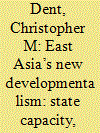

|
|
|
|
|
| Summary/Abstract |
This paper argues that to understand the relevance of developmental states in East Asia and elsewhere, we need to focus on the changing development agenda in the early twenty-first century, especially how this connects with the global challenge of climate change and thereby sustainable, low-carbon development. It combines theories on state capacity and ecological modernisation to form the ‘new developmentalism’ concept. This is applied to study revitalised and refocused forms of state capacity aimed at realising the transformative economic objectives associated with sustainable development. New developmentalism helps us understand not only current state capacity practice in a climate challenged world but also how we have moved beyond original conceptions of developmental statism. It may be understood in the wider context of the sustainable development agenda and climate interventionism. As is argued, new developmentalism is most clearly evident in East Asia but can be applied in a wider geographic sense where strong forms of developmental state capacity are exercised towards meeting transformative sustainable development goals.
|
|
|
|
|
|
|
|
|
|
|
|
|
|
|
|
| 5 |
ID:
192157
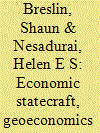

|
|
|
|
|
| Summary/Abstract |
In this introduction to the special issue, we establish the overarching objective for the collection; to investigate the salience and efficacy of conceptions of Economic Statecraft (ES) and Geoeconomics for understanding and explaining shifts in state-market relationships in a number of regional political economies. After a very short overview of different generations of ES research, we establish the set of common questions that each of the papers address, and how we arrived at them as the research project evolved. We point to the importance of ensuring that ES is not just thought of as something that the more powerful regional states engage in, and the need to adopt a three-part analytical distinction between different components of ES: motivations and objectives; actions and tools; and outcomes and consequences. This allows us to trace the relationship between goals and effects, provides a basis for comparative studies, and makes it easier to make a distinction between ES and other forms of state involvement in the economy.
|
|
|
|
|
|
|
|
|
|
|
|
|
|
|
|
| 6 |
ID:
155433
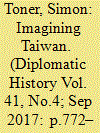

|
|
|
|
|
| Summary/Abstract |
The paper explores South Vietnamese efforts to draw on the lessons of the Taiwan and Korean “developmental states” and to employ these lessons in Saigon’s modernization efforts. It argues that development, shaped by debates about Taiwan and Korea, played an important role in the outcome of the war.
|
|
|
|
|
|
|
|
|
|
|
|
|
|
|
|
| 7 |
ID:
128469
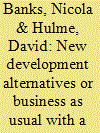

|
|
|
|
|
| Publication |
2014.
|
| Summary/Abstract |
The state, market and civil society constitute the three main institutional domains of the 'development' landscape. Perceptions of these three actors have evolved over time alongside conceptualisations of what constitutes and best promotes 'development'. The array of contributions in this special issue points towards a worrying implication for the transformative potential of development activities and interventions. While the new diversity in actors and alliances brings new opportunities for development, we see the majority placing the responsibility for development in the hands of the state and market. Furthermore, the hollowing out of civil society - apparent from the lack of priority given to it in the Global South and the promotion of development as 'responsible consumerism' in the North - represents a missed opportunity for consolidating the progress made in the commitment to poverty reduction since the UN Millennium Declaration. Reaching greater transformative potential would require focusing as much on inclusive social development as on inclusive economic development. Doing so would tackle the big questions of power and inequality that remain among the root causes of poverty today.
|
|
|
|
|
|
|
|
|
|
|
|
|
|
|
|
| 8 |
ID:
157713
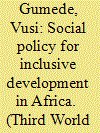

|
|
|
|
|
| Summary/Abstract |
The paper revisits the discourse on development in Africa, following in the footsteps of leading development thinkers and focusing on social policy. Some of the thinkers and scholars have specifically and directly discussed development discourse in Africa. Others have made insightful points regarding inclusive development in Africa even though not directly engaging with development discourse. The paper also acknowledges earlier thinking regarding development in Africa, including perspectives that deal with underdevelopment. The paper concerns itself with the critical role that social policy can play in ensuring inclusive development in Africa. The interface between economic and social policy is emphasised. Although Africa faces many intractable challenges, most of which are externally imposed, robust social policies will go a long way in bringing about effective social and economic development. In the main, though, Africa needs a comprehensive socio-economic development approach that can ensure lasting inclusive development. Social policies are critical for any development endeavour in African countries. Another main point that the paper makes is that economic transformation is not enough to fully advance wellbeing in Africa (and probably the world at large). By restructuring economies in Africa, not much would be achieved though some gains would be made.
|
|
|
|
|
|
|
|
|
|
|
|
|
|
|
|
|
|
|
|
|